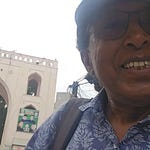This week I join you from Malta to share my 5 minutes of fame for this week. And what a week to reflect on the many political and social issues emerging from Somalia. I will leave the kerfuffle about the Ministry of Women’s affairs alone, as I have my own standard which decorum will not allow me to ignore. However, I will add my 2 cents to the re-opening of the National Consultative Council (NCC) meeting in Mogadishu on Sunday to address security, state-building, and elections. My take on this is a kind of curve ball and it is a different perspective but pertinent to its success or failure. Please note, it is purely for promoting intellectual discussion. Here goes:
The concept of the "Shia Crescent," a term often associated with Iran's growing influence across the Middle East, provides an insightful analogy to explore the dynamics within Somalia's unique political structure, particularly the 4.5 power-sharing model, which should be updated to 5.5. This model, established as a means of distributing political representation among Somalia's major clan groups, has inadvertently created a "Darood Crescent" within the country. Much like the Shia Crescent, where Iran seeks to establish a strategic land corridor through Iraq, Syria, and Lebanon, this "Darood Crescent" extends from Puntland in Somalia, through Ethiopia’s eastern Somali region, down to Jubaland.
Iran’s influence across the Shia Crescent seeks to foster a continuous "land bridge" of allied territories, countering regional adversaries and creating a cohesive front for Shia influence. Similarly, the 4.5 (should be 5.5) model appears to have fostered an unintended consolidation of influence for a particular Somali clan family. This has effectively aligned clan interests across Puntland and Jubaland, reinforcing the notion of a “Darood Crescent” and influencing Somalia’s political geography in a way that potentially marginalizes other groups. This configuration is not coincidental but reflects a nuanced manifestation of clan-based federalism—akin to a structural mother nurturing a defined outcome, as suggested.
The old 4.5 system’s implications are profound: it entrenches tribal identities within the federal structure, much like the alignment of sectarian identities along the Shia Crescent. This analogy emphasizes that, while federalism was intended to balance representation, it has inadvertently created dominant pathways for influence. As a result, one group’s strategic placement across regions is transforming Somalia’s internal map in ways that could shape its federal future, with other groups potentially relegated to marginal roles, reflecting perhaps a broader “full moon” rather than a mere crescent.
The analogy between the Shia Crescent and the Darood Crescent elucidates how structured federalism may crystallize particular clan influences over time. The long-standing nature of these clan dynamics underscores the need for alternative approaches to equitable representation within Somalia's federal framework if a truly balanced statehood is to emerge. Feedback and critiques are invited to further examine the analogy's validity and implications for Somalia’s socio-political landscape.
I wrote the above in different tone for my other audience in the popular social media outlets, FB (sorry meta) and Twitter (sorry again X). As anticipated the feedback was very loud and in some cases pedestrian!
Let me digress…
As a digital nomad, I do some of my research work while on the road from airport lounges, via WiFi while flying over many time zones which makes date/time sensitive work interesting. Even numbering the year by week is not immune as I have discovered. But the main message this week is about the reality on the ground and the urgent need for wise leadership in this difficult times nationally, regionally and for that matter even globally.
I sought inspiration from the tech world. I was in India for the ITU standard event, then Gitex in Dubai followed by the Cardano summit. The elephant in the room in all three events was Ai and its unpredictable impact on all of us as citizens and the leaders who so far are missing in action. To many in Somalia this might not seem an urgent problem, but as I have written in other fora, Somalia is not Island in another planet.
To highlight the point I am trying to make I have decided to share Don Tapscott’s amazing closing remarks of his keynote speech at the Cardano Summit in Dubai (https://summit.cardano.org/ ), because he captures the essence of leadership in the 21st Century. If this piques your curiosity here is the full day’s presentation and Don Tapscott’s last speech of Day 1 ( start from 9:07:00) if 9 hrs of tech talk is not your cup of tea.
I read Tapscott’s books1 while in graduate school many years ago. I would highly recommend his books, if you are interested in digital economy, blockchain, and the transformative effects of digital innovation on business and society.
Tapscott has been influential in popularizing terms like "digital economy" and "blockchain revolution," and his work is frequently cited in discussions on digital transformation, business innovation, and the future of technology-driven societies. I managed to have a brief interesting discussion with him after his speech about leadership. We agreed that wise leaders have become endangered species.
And here is a clip where I shared my thoughts on technology in Somalia, and the failure of two invited minister to attend this global tech event.. maybe tech shy, InshaAllah next year.
https://www.youtube.com/live/GInMNl7WOoc
Comments, feedback as always welcome.
Don Tapscott is a Canadian author and his most notable works include:
"Wikinomics: How Mass Collaboration Changes Everything" (2006)
"The Digital Economy: Promise and Peril in the Age of Networked Intelligence" (1995)
"Blockchain Revolution: How the Technology Behind Bitcoin Is Changing Money, Business, and the World" (2016)
"Grown Up Digital: How the Net Generation Is Changing Your World" (2008) –













